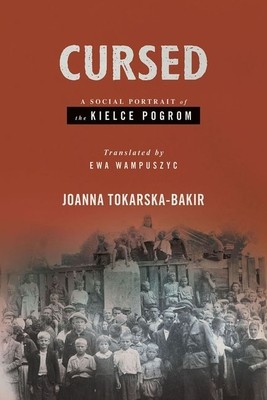
- We will send in 10–14 business days.
- Author: Joanna Tokarska-Bakir
- Publisher: Cornell University Press
- ISBN-10: 1501771485
- ISBN-13: 9781501771484
- Format: 15.8 x 23.2 x 4.6 cm, kieti viršeliai
- Language: English
- SAVE -10% with code: EXTRA
Reviews
Description
In Cursed, Joanna Tokarska-Bakir investigates the Kielce Pogrom of 4th July, 1946, a milestone in the periodization of the Jewish diaspora. This massacre led Polish Jews who had survived the Holocaust to realize that there was nothing left for them in post-war Poland. Panic-stricken, they fled to the West in droves. The Kielce Pogrom remains a negative reference point in the Polish historical narrative, representing a lack of recognition of antisemitism as a deep-rooted, ubiquitous element of Polish identity. Tokarska-Bakir takes a fresh look at both predicaments, weighing the evidence and conflicting arguments to revise the perception of Poland as a country groaning under the Soviet boot that did not prevent the spread of antisemitism but instead attempted to turn a blind eye to it.
The resulting analysis is filled with revelations from the archives, previously classified sources of the communist Ministry of Public Security, the Citizens' Militia, and the Polish Army, and oral testimonies by Jewish survivors. Drawing on archival research pertaining to every single Kielce militiaman and functionary of the Office of Public Security whose details were possible to find, Tokarska-Bakir examines the dominant hypotheses about the Kielce Pogrom, step by step.
Cursed reveals a vivid portrait of society by detailing the wartime pasts of the militia and army as murderers of Jews and dispelling the comfortable generalization about Polish history being black and white. The result is an engaging narrative presented with scholarly exactitude revealing the fate of people whose descendants are today scattered across several continents.
EXTRA 10 % discount with code: EXTRA
The promotion ends in 23d.15:40:52
The discount code is valid when purchasing from 10 €. Discounts do not stack.
- Author: Joanna Tokarska-Bakir
- Publisher: Cornell University Press
- ISBN-10: 1501771485
- ISBN-13: 9781501771484
- Format: 15.8 x 23.2 x 4.6 cm, kieti viršeliai
- Language: English English
In Cursed, Joanna Tokarska-Bakir investigates the Kielce Pogrom of 4th July, 1946, a milestone in the periodization of the Jewish diaspora. This massacre led Polish Jews who had survived the Holocaust to realize that there was nothing left for them in post-war Poland. Panic-stricken, they fled to the West in droves. The Kielce Pogrom remains a negative reference point in the Polish historical narrative, representing a lack of recognition of antisemitism as a deep-rooted, ubiquitous element of Polish identity. Tokarska-Bakir takes a fresh look at both predicaments, weighing the evidence and conflicting arguments to revise the perception of Poland as a country groaning under the Soviet boot that did not prevent the spread of antisemitism but instead attempted to turn a blind eye to it.
The resulting analysis is filled with revelations from the archives, previously classified sources of the communist Ministry of Public Security, the Citizens' Militia, and the Polish Army, and oral testimonies by Jewish survivors. Drawing on archival research pertaining to every single Kielce militiaman and functionary of the Office of Public Security whose details were possible to find, Tokarska-Bakir examines the dominant hypotheses about the Kielce Pogrom, step by step.
Cursed reveals a vivid portrait of society by detailing the wartime pasts of the militia and army as murderers of Jews and dispelling the comfortable generalization about Polish history being black and white. The result is an engaging narrative presented with scholarly exactitude revealing the fate of people whose descendants are today scattered across several continents.


Reviews